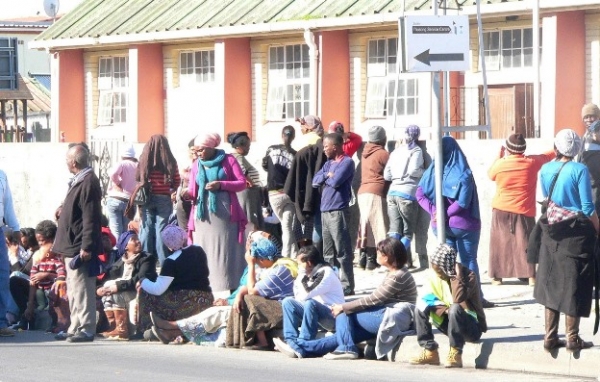Money lender targets social grant beneficiaries

At the weekend the Methodist Church in Nyanga near the taxi terminus operates as a church. But on weekdays it is the scene of a money lending business, with dozens of people queuing for loans from Moneyline Financial Services, a subsidiary of NET1, the company that pays social grants on behalf of the South African Social Security Agency.
When GroundUp visited the church last week, eight Moneyline employees were stationed at a row of tables in the church, with papers and computers. The queue of applicants for loans stretched into the street.
Last September, minister of Social Development Bathabile Dlamini warned that the department would take steps to prevent social grants being used as collateral for loans.
She also said that SASSA payment systems must be designed in such a way that social grant beneficiaries’ bank accounts were “off limits” to creditors and that SASSA bank accounts and confidential information of grant recipients must be protected.
But most of the people queuing last week seemed to be SASSA beneficiaries. One Moneyline employee told GroundUp that applicants for a loan must provide a SASSA card, an identity document and proof of address.
Some people in the queue told GroundUp that loan applications from beneficiaries of social grants were rarely rejected.
Dr Waldie Terblanche, SASSA regional manager for the Western Cape, said in an email he was aware that Moneyline targeted social security beneficiaries.
“We are aware of the activities of various companies that provide loans to social security beneficiaries. The company that you referred to [Moneyline] is one of them. They do target social security beneficiaries and provide them with loans within the unsecured money market.”
“We are also aware of the activities of the company in Nyanga and although SASSA does not support the loans made to beneficiaries, we cannot prevent it as the company operates within the framework of the financial services sector.’
According to local residents, the business operates every weekday. People from areas near Nyanga also come to the church to get loans. Some stand in queues for more than five hours, sometimes to secure a loan for just R300.
Last Thursday, a woman who identified herself as Akhona said that she had stood in the line since 6:30am because she had to be at work by 10am. She said she needed the loan because she did not have money for transport to work for the following week.
Akhona, a domestic worker, said almost every month she borrowed R200 and it was deducted from her SASSA child grant of R640 a month .
“ I work part-time, so sometimes I only get paid R1,800 a month. And it’s not enough because transport is expensive and I have to buy household things, and support other family members. So getting a loan here is actually helpful for me.”
Terblanche said SASSA did not allow the deduction of instalments from the social grant which was paid into the bank accounts of beneficiaries. But as soon as the money was deposited into the bank accounts, deductions took place.
“The SASSA payment card is a debit card and operates within the normal banking system in the country allowing beneficiaries to transact at ATMs or merchants. This unfortunately creates the opportunity for deductions to be made by financial institutions as soon as funds are deposited into accounts.”
Nkwakha Khoza, who was escorting her 79-year-old grandfather to get a loan of R650, said at home there was no food and no one in the household was employed. They survive on social grant money for the children and the grandfather’s old age grant of R1,370 a month.
“I normally go with my grandfather to get the grant every first week of the month … Sometimes it can be R800, depending on the deductions due to loans.”
“In a month we survive on R1,000 or less for groceries,” said Khoza.
Terblanche said:“We are encouraging beneficiaries not to take up these kind of loans with high interest rates as it locks them in a cycle of poverty where they need to take up additional loans to service previous loans.”
In April 2014 the Constitutional Court ordered SASSA to re-issue the social grants tender which was awarded to a division of Net1, Cash Paymaster Services, in 2012. Following a campaign by the Black Sash and others, SASSA proposed new requirements for the social grants tender, to prohibit the deduction of airtime payments and other illegal deductions from SASSA accounts.
Net1 announced in May that it would withdraw from the new social grants tender process.
Support independent journalism
Donate using Payfast

Don't miss out on the latest news
We respect your privacy, and promise we won't spam you.
Next: Police don’t give us back our goods after a raid, say traders
Previous: Unhappiness with electricity costs ignites protests in Pietermaritzburg

This article is licensed under a Creative Commons Attribution-NoDerivatives 4.0 International License.
